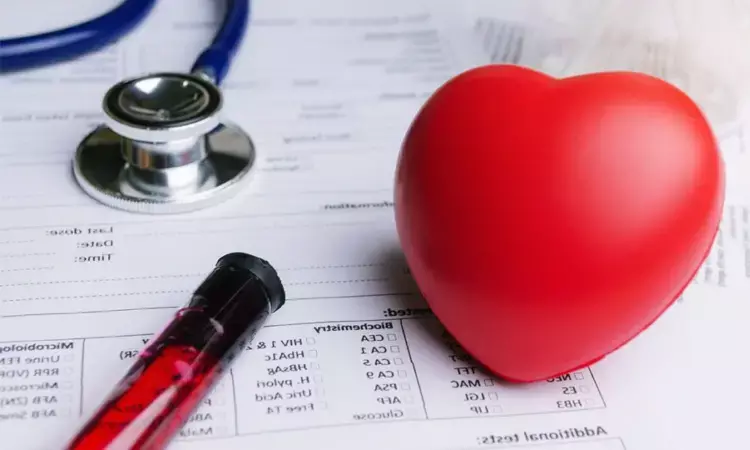- Home
- Medical news & Guidelines
- Anesthesiology
- Cardiology and CTVS
- Critical Care
- Dentistry
- Dermatology
- Diabetes and Endocrinology
- ENT
- Gastroenterology
- Medicine
- Nephrology
- Neurology
- Obstretics-Gynaecology
- Oncology
- Ophthalmology
- Orthopaedics
- Pediatrics-Neonatology
- Psychiatry
- Pulmonology
- Radiology
- Surgery
- Urology
- Laboratory Medicine
- Diet
- Nursing
- Paramedical
- Physiotherapy
- Health news
- Fact Check
- Bone Health Fact Check
- Brain Health Fact Check
- Cancer Related Fact Check
- Child Care Fact Check
- Dental and oral health fact check
- Diabetes and metabolic health fact check
- Diet and Nutrition Fact Check
- Eye and ENT Care Fact Check
- Fitness fact check
- Gut health fact check
- Heart health fact check
- Kidney health fact check
- Medical education fact check
- Men's health fact check
- Respiratory fact check
- Skin and hair care fact check
- Vaccine and Immunization fact check
- Women's health fact check
- AYUSH
- State News
- Andaman and Nicobar Islands
- Andhra Pradesh
- Arunachal Pradesh
- Assam
- Bihar
- Chandigarh
- Chattisgarh
- Dadra and Nagar Haveli
- Daman and Diu
- Delhi
- Goa
- Gujarat
- Haryana
- Himachal Pradesh
- Jammu & Kashmir
- Jharkhand
- Karnataka
- Kerala
- Ladakh
- Lakshadweep
- Madhya Pradesh
- Maharashtra
- Manipur
- Meghalaya
- Mizoram
- Nagaland
- Odisha
- Puducherry
- Punjab
- Rajasthan
- Sikkim
- Tamil Nadu
- Telangana
- Tripura
- Uttar Pradesh
- Uttrakhand
- West Bengal
- Medical Education
- Industry
Add on Acetazolamide to loop diuretics accelerated decongestion in HF patients: NEJM

Belgium: Acetazolamide added to loop diuretic treatment resulted in a higher rate of effective decongestion in patients with acute decompensated heart failure, says an article published in The New England Journal of Medicine.
It is uncertain if acetazolamide, a carbonic anhydrase inhibitor that lowers proximal tubular sodium reabsorption, might increase loop diuretic efficiency, perhaps leading to greater and faster decongestion in patients with acute decompensated heart failure with volume overload. As a result, Wilfried Mullens and colleagues undertook this research to assess the efficacy of acetazolamide in heart failure.
In this multicenter, randomized trial, researchers randomly assigned a total of 519 patients suffering from acute decompensated heart failure, clinical signs of volume overload (pleural effusion, edema, or ascites), and an N-terminal pro-B-type natriuretic peptide level of more than 1000 pg per milliliter or a B-type natriuretic peptide level of more than 250 pg per mill (at a dose equivalent to twice the oral maintenance dose). The randomization was stratified based on the left ventricular ejection fraction (40% or above). The primary end goal was effective decongestion, defined as the absence of symptoms of volume overload three days following randomization and without the need for decongestive treatment escalation.
The key findings of this study were:
1. 108 of 256 patients (42.2%) in the acetazolamide group and 79 of 259 (30.5%) in the placebo group experienced successful decongestion (risk ratio, 1.46).
2. 76 of 256 patients (29.7%) in the acetazolamide group and 72 of 259 patients (27.8%) in the placebo group had death from any cause or rehospitalization for heart failure (hazard ratio, 1.07).
3. Higher cumulative urine production and natriuresis were linked to acetazolamide therapy, suggesting improved diuretic efficacy.
4. Similar rates of adverse events, hypokalemia, deteriorating renal function, and hypotension were seen in the two groups.
Reference:
Mullens, W., Dauw, J., Martens, P., Verbrugge, F. H., Nijst, P., Meekers, E., Tartaglia, K., Chenot, F., Moubayed, S., Dierckx, R., Blouard, P., Troisfontaines, P., Derthoo, D., Lassus, J., … Dupont, M. (2022). Acetazolamide in Acute Decompensated Heart Failure with Volume Overload. In New England Journal of Medicine (Vol. 387, Issue 13, pp. 1185–1195). Massachusetts Medical Society. https://doi.org/10.1056/nejmoa2203094
Neuroscience Masters graduate
Jacinthlyn Sylvia, a Neuroscience Master's graduate from Chennai has worked extensively in deciphering the neurobiology of cognition and motor control in aging. She also has spread-out exposure to Neurosurgery from her Bachelor’s. She is currently involved in active Neuro-Oncology research. She is an upcoming neuroscientist with a fiery passion for writing. Her news cover at Medical Dialogues feature recent discoveries and updates from the healthcare and biomedical research fields. She can be reached at editorial@medicaldialogues.in
Dr Kamal Kant Kohli-MBBS, DTCD- a chest specialist with more than 30 years of practice and a flair for writing clinical articles, Dr Kamal Kant Kohli joined Medical Dialogues as a Chief Editor of Medical News. Besides writing articles, as an editor, he proofreads and verifies all the medical content published on Medical Dialogues including those coming from journals, studies,medical conferences,guidelines etc. Email: drkohli@medicaldialogues.in. Contact no. 011-43720751


